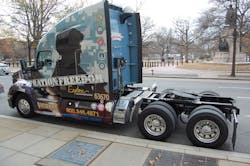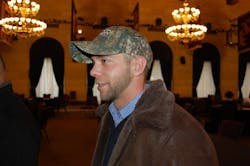So last week, the U.S. Chamber of Commerce Foundation’s “Hiring Our Heroes” organization, in partnership with Kenworth Truck Co. and Fastport, awarded U.S. Navy veteran and Werner Enterprises’ driver Troy Davidson a brand new Kenworth T680 highway tractor with all the trimmings as the winner of the group’s Transition Trucking: Driving For Excellence contest.
That event aimed to highlight the accomplishments of “rookie” drivers – big rig operators with a year or so of experience under their belts – who’d transitioned from military careers into the trucking industry.
Thing is, none of the three finalists for this award – Davidson included – can even remotely be considered “rookies” in the literal sense of the word. For all three of them are reservoirs of experience almost any business should covet; especially the trucking industry.
Take Russell Hardy for starters; a tanker driver for Trimac Transportation who served for four years in the U.S. Navy before switching to the U.S. Army for a 16-year stint that included piloting big heavy expanded mobile tactical trucks or “HEMTTs” hauling Patriot missile systems.
As a runner up in the “Transition Trucking” contest, Hardy received $10,000 (just in time for Christmas no less!) yet remained totally unfazed by all the media hoopla surrounding the event – no doubt in large measure to the kinds of stresses he faced driving trucks in the Army.
“I enjoy driving and found with trucking that it offered a shorter transition period from the military to a civilian career,” he explained to me.
Hardy added, rather wryly, that one of the “perks” of a civilian truck driving job is that he doesn’t have to wear a helmet. “It’s not without reason we had to wear helmets driving HEMTTs; they have hard steel headliners for protection,” he explained. “You don’t want to hit one of those without wearing a helmet.”
Interestingly, Hardy noted that his naval career also prepared him well for hauling tanker loads in and out of chemical and industrial plants. “Aboard ship in the Navy, you are surrounded by pipes; you are used to working in confined spaces,” he said.
Hardy also relishes that challenges posed by tanker operations – a type of tractor-trailer that is far more prone to rollovers compared to other combination vehicles.
“A unique kind of driver is needed to haul tankers,” Jeff French, Trimac’s director of central operations, told me at the event. “A lot of candidates wash out.”
Interestingly, Michael Ortiz – a regional recruiter for Trimac, who, like French, attended the event to support Hardy’s bid for the new Kenworth T680 – noted in an earlier statement that the company started a military hiring effort in July of last year and that Hardy, with just over a year under his belt driving civilian big rigs, quickly made it into Trimac’s Elite Driver program.
“That [Elite Driver program] has become just like a ‘special forces’ unit to help make capacity more available, capitalize on market conditions, and initiate start-up operations as necessary,” Ortiz said.
That’s not a surprise to the event’s other runner up, Kevin Scott – a driver for flatbed carrier TMC Transportation and who also took home $10,000 – as he told me that after just over a year in the long-haul business, he’s already in the top 7% of TMC’s drivers in terms of pay and is now working as a driver trainer as well.
In the U.S. Army, Scott served as a 15 Tango Blackhawk helicopter mechanic and crew chief. “Everyone thinks the pilots are in charge of a Blackhawk; but that bird belonged to me,” he told me. Time under fire in Iraq just reinforced Scott’s belief in order and discipline, which are traits he tries to pass on to his trainees.
“It’s all about the details with flatbeds: chains, tarps, your vehicle weights,” Scott added; details that mesh perfectly with his helicopter maintenance skills.
The reason Scott specifically joined trucking after his military career is he couldn’t stand the “monotony” of a five-day a week stay-in-one-place job. “Though I am based out of Gulfport, MS, I really live in my truck; I’m driving all the lower 48 states,” he said.
Scott also summed up trucking this way for me: “There a lot of ‘hurry up and wait’ due to traffic jams, among other things, so patience is a virtue,” he explained. “For that and other reasons, you either hate this industry or love this industry – there is no middle ground.”
Then there’s Werner’s Davidson, the winner of the “Transition Trucking” event.
He joined the U.S. Navy out of high school and served for six years, becoming a jet engine mechanic and eventually working with the famed “Blue Angels” aerial acrobatics team for a time.
“That gives you an idea of what kind of work ethic he possesses,” one of Davidson’s family members told me.
That family member added that Davidson’s mother died of complications from multiple sclerosis when he was just 12, meaning he “had to become adult” at a young age – a challenge even in the best of times.
Yet not only did Davidson persevere, he excelled, winning a slew of awards in high school before entering the Navy and mastering the intricacies of jet engine maintenance.
However, once he left the Navy, Davidson didn’t feel challenged by the aircraft maintenance world. On a whim, he went with a friend to check out a local truck driving school and quickly decided to pilot big rigs for a living.
Just over a year into his job, with the keys to a new Kenworth T680 in his pocket, Davidson now aims to follow in the footsteps of Werner’s founder Clarence Werner (who began stepping back from day-to-day control of his company back in May) and build up his own trucking company.
“I really hope to have my own fleet someday,” Davidson told me, adding that he’s relaying on traits he honed to a razor’s edge in the military – discipline, integrity, and attention to detail – to achieve that vision.
Tell you one thing; trucking can’t go wrong adding military veterans like Hardy, Scott and Davidson to its ranks. Let’s hope many more will follow.



